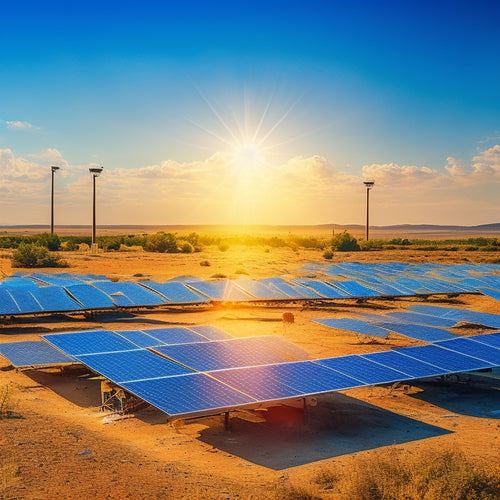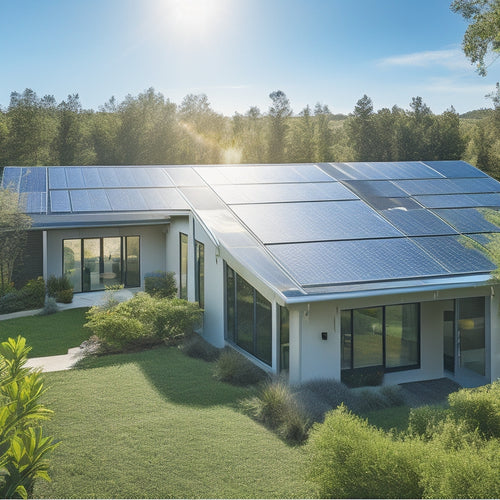
Mini Solar System for Home
Share
You can greatly reduce energy expenses and decrease reliance on the grid with a mini solar system, potentially leading to zero energy bills. By utilizing the power of the sun, you'll not only save money but also enhance your property value, making your home more appealing to buyers. High-efficiency solar panels, advanced technology, and minimal maintenance requirements guarantee peak energy production and longer system lifetimes. To get the most out of your mini solar system, it's crucial to understand your energy consumption patterns and refine your energy usage - and that's just the beginning of unleashing a greener, more sustainable future for your home.
The Essentials
- Mini solar systems can significantly cut energy expenses and reduce reliance on the grid for homeowners.
- High-efficiency solar panels with advanced cell technology can achieve efficiencies exceeding 23% and maximize energy output.
- Installing mini solar systems enhances home appeal and energy efficiency, making homes more attractive to buyers and increasing property value.
- Energy audits and monitoring can identify high-consumption appliances and peak energy usage times, informing decisions on energy-efficient replacements.
- With minimal upkeep and longer system lifespans, mini solar systems provide a cost-effective and sustainable solution for home energy needs.
Zero Energy Bills
You can markedly reduce your energy expenses by implementing a mini solar system for your home, which starts with lowering power consumption.
By optimizing your energy usage, you'll minimize the amount of energy your home requires, making it easier to eliminate energy waste.
For instance, energy efficiency solutions like insulation and smart thermostats can greatly contribute to reducing your energy needs.
With a well-designed system, you can potentially reach a point where your energy bills are zero, putting more money back in your pocket.
Lower Power Consumption
By integrating a mini solar system into your home, homeowners can greatly reduce their reliance on the grid, slashing power consumption and, subsequently, energy bills. This is especially true when combined with energy saving tips and sustainable practices. Not only will you reduce your carbon footprint, but you'll also enjoy significant savings on your energy bills.
Here's a breakdown of how you can lower your power consumption:
| Appliance | Energy Consumption | Energy Saving Tips |
|---|---|---|
| Refrigerator | 1.5 kWh/day | Replace with an energy-efficient model, adjust temperature settings |
| Lighting | 0.5 kWh/day | Switch to LED bulbs, turn off lights when not in use |
| Air Conditioner | 2 kWh/day | Adjust thermostat settings, use fans instead |
| Computer | 0.25 kWh/day | Turn off when not in use, use power-saving mode |
Eliminate Energy Waste
Achieving zero energy bills requires a thorough approach to eliminate energy waste, which can be achieved by identifying and addressing inefficiencies in your home's energy usage.
Conducting energy audits is a vital step in this process, as it helps you pinpoint areas of energy loss and opportunities for improvement. By identifying these inefficiencies, you can take targeted measures to optimize your energy consumption.
With the help of affordable DIY home solar kits Renewable Energy Systems, homeowners can now easily shift to renewable energy and start saving on their electricity bills. Renewable incentives can also play a noteworthy role in your path to zero energy bills. Many governments offer rebates, tax credits, or low-interest loans to homeowners who invest in renewable energy systems, such as solar panels. By utilizing these incentives, you can offset the initial cost of installing a mini solar system and accelerate your return on investment.
To eliminate energy waste, you'll need to address issues like air leaks, inadequate insulation, and outdated appliances. By sealing air leaks, adding insulation, and upgrading to energy-efficient appliances, you can greatly reduce your energy consumption and move closer to achieving zero energy bills.
With a combination of energy audits, renewable incentives, and targeted efficiency measures, you can break free from the constraints of traditional energy sources and enjoy the freedom that comes with generating your own clean energy.
Increased Property Value
By installing a mini solar system, you'll not only reduce your energy bills but also enhance your home's energy efficiency, making it more attractive to potential buyers.
With renewable energy becoming increasingly popular, incorporating photovoltaic systems into your home can greatly increase its appeal.
This, in turn, can markedly increase your property's resale price, giving you a higher return on investment.
With a solar-powered home, you can expect to reap the benefits of a higher property value, making your home a more prized asset.
Energy Efficiency Boost
Your mini solar system becomes a beneficial asset to your home, greatly enhancing its appeal to potential buyers and increasing its resale value. As you utilize the power of the sun, you're not only reducing your reliance on the grid but also slashing your energy bills.
With advanced solar panel materials, your mini system can generate a substantial amount of electricity, offsetting your energy consumption and minimizing your carbon footprint.
Moreover, integrating energy storage solutions into your mini solar system allows you to store excess energy generated during the day for use during the night or on cloudy days. This guarantees a steady supply of clean energy, further reducing your dependence on fossil fuels.
Higher Resale Price
Installing a mini solar system in your home greatly enhances its resale value, making it a more attractive option for potential buyers. As you consider investing in a mini solar system, it's crucial to think about the long-term benefits, particularly when it comes to selling your property.
In today's competitive resale market, energy-efficient features like solar panels can considerably increase your property's appeal. In fact, studies have shown that homes with solar panels sell faster and for higher prices than those without.
When you decide to sell your home, the mini solar system will be a major selling point, especially for environmentally conscious and budget-savvy buyers. You can expect to recoup a noteworthy portion of your initial investment, making the system a beneficial addition to your property.
Additionally, the increased property value will give you a competitive edge in the resale market, allowing you to negotiate a better sale price. By installing a mini solar system, you're not only reducing your energy bills but also making a smart investment in your home's future.
High-Efficiency Solar Panels
You'll want to contemplate high-efficiency solar panels that boast high power density, generating more electricity per unit area.
These advanced panels employ state-of-the-art cell technology, allowing them to convert sunlight into energy with greater precision.
Top brands like Tesla and SunPower offer high-efficiency solutions with residential solar panels that can greatly reduce your carbon footprint.
High Power Density
High-efficiency solar panels boast a high power density, which greatly improves the overall energy output of your mini solar system. This means you can generate more electricity from a smaller surface area, making them ideal for homes with limited roof space.
With high power density, you'll require fewer panels to meet your energy needs, reducing the overall cost of your mini solar system.
High power density is achieved through advanced solar cell efficiency. By increasing the efficiency of each solar cell, manufacturers can pack more power into a smaller area.
This leads to a higher wattage output per square foot, making the most of the available space on your roof. As a result, you'll enjoy a faster return on investment and greater independence from the grid.
Advanced Cell Technology
Three decades of research and development have led to substantial advancements in solar cell technology, culminating in the creation of high-efficiency solar panels. As you investigate the world of mini solar systems for your home, you'll notice that progressive cell technology plays an essential role in maximizing energy output.
With solar innovations like multi-junction cells and passivated emitter and rear cells (PERC), you can expect cell efficiency to reach new heights. These high-efficiency solar panels boast higher power outputs per unit area, making them ideal for small-scale solar systems.
By utilizing advanced materials and manufacturing techniques, manufacturers have achieved extraordinary gains in cell efficiency, translating to more power per panel. For instance, some high-efficiency panels boast efficiencies exceeding 23%, greatly outperforming their traditional counterparts.
As you consider a mini solar system for your home, look for advanced cell technology that prioritizes high-efficiency solar panels. With these state-of-the-art innovations, you'll be able to generate more power from a smaller footprint, giving you the freedom to capture the sun's energy and reduce your reliance on the grid.
Assess Your Energy Usage
You need to understand your energy consumption patterns to determine the right size of your mini solar system.
As you consider renewable energy solutions, it's crucial to assess your daily power needs to reduce your reliance on the grid and lower your utility bills.
Start by tracking your daily power needs, including the wattage of each appliance and the number of hours you use them.
This assessment will help you calculate your total daily energy requirement, which is vital for designing an efficient and cost-effective solar system.
Energy Consumption Patterns
Evaluating your energy usage is essential to understanding where exactly your energy consumption is going, and identifying areas for improvement.
By analyzing your energy habits, you'll uncover consumption trends that can help you set realistic efficiency goals. Take a closer look at your usage patterns to identify opportunities for behavioral changes that can reduce your energy consumption.
Start by monitoring your energy usage to understand how your household appliances contribute to your overall energy consumption.
Consider your lifestyle impacts, such as cooking habits, lighting usage, and entertainment systems.
You'll also want to account for seasonal variations in your energy usage, as heating and cooling can greatly affect your consumption.
Daily Power Needs Assessment
By pinpointing the times of day when your energy usage peaks, a daily power needs assessment helps identify the appliances and habits driving your consumption.
This essential step in creating a mini solar system for your home allows you to understand your energy usage patterns, optimize your energy efficiency, and ultimately, achieve energy independence.
Conducting an energy audit of your home will help you identify areas of inefficiency and opportunities for improvement.
You can start by monitoring your energy usage over a period of time, taking note of the times of day when your energy consumption is highest.
This will give you a clear depiction of which appliances and devices are using the most energy.
You can then use this information to make informed decisions about which appliances to replace with energy-efficient alternatives and when to adjust your usage habits.
Longer System Lifespan Guaranteed
You'll be pleased to know that a mini solar system for your home is designed to require minimal upkeep, which translates to lower maintenance costs for you.
With fewer moving parts and no fuel consumption, the system's components are less prone to wear and tear, reducing the need for frequent repairs or replacements.
This means you can enjoy a longer system lifespan while keeping your expenses in check.
Low Maintenance Costs
With a mini solar system for your home, maintenance costs are considerably reduced, assuring a longer system lifespan. You'll enjoy a significant decrease in expenses since solar panels require minimal upkeep. This means you won't need to worry about frequent repairs or replacements, freeing up your time and resources for more important things.
By following simple solar maintenance tips, such as regular cleaning and inspections, you can guarantee your system operates at peak efficiency. This proactive approach helps prevent potential issues, reducing the likelihood of costly repairs down the line.
Additionally, cost-effective solutions like energy monitoring systems allow you to track your energy production, identifying opportunities to optimize your system's performance.
With a mini solar system, you'll experience fewer maintenance headaches and lower costs, resulting in a longer system lifespan. By taking advantage of these benefits, you'll enjoy greater freedom and peace of mind, knowing your energy needs are being met while keeping your expenses in check.
Frequently Asked Questions
Can I Install Solar Panels on My Own?
You can attempt a DIY installation, but it's essential to research and comply with local solar panel regulations, ensuring a safe and efficient setup, as improper installations can void warranties and compromise system performance.
Are Solar Panels Resistant to Extreme Weather?
You think solar panels are fragile, but surprise! They're built to withstand Mother Nature's tantrums. You'll be relieved to know they're designed with solar panel durability and extreme weather resilience in mind, so go ahead, utilize that freedom-giving energy!
Do Solar Panels Require Frequent Cleaning?
You'll want to clean your solar panels regularly, as dust accumulation reduces their efficiency by up to 25%. Frequent cleaning guarantees peak performance, but the frequency depends on your location and climate, so you'll need to monitor and adjust accordingly.
Can I Use Solar Energy for Heating and Cooling?
You can utilize solar energy for heating and cooling, leveraging its benefits to maximize efficiency; with proper system design, you'll enjoy improved heating efficiency, reduced energy bills, and a cleaner, more independent living space.
Are There Any Maintenance Costs for Solar Panels?
You'll be glad to know that, like the 2019 study on a California home, you'll likely spend around $1,500 on maintenance costs over 25 years, which is offset by the $15,000 in energy savings, considering your initial installation costs.
Final Thoughts
You'll be living the dream with your mini solar system for home! Imagine never paying a single penny for energy again - zero energy bills, period! Your property value will skyrocket, and with high-efficiency solar panels, you'll be generating more power than you know what to do with. Assess your energy usage and get ready to reap the benefits of a longer system lifespan, guaranteed. Your wallet (and the planet) will thank you - it's a win-win!
Related Posts
-

What Happens Without a Charge Controller in Solar Panels
Without a charge controller in your solar panel system, you risk overheating batteries due to overcharging, which can...
-

Why Outdoor Solar Lighting Systems Are Sustainable
Outdoor solar lighting systems are sustainable because they utilize renewable energy, drastically reducing your carbo...
-

Installing Metal Solar Roofs for Maximum Energy Efficiency
Installing metal solar roofs can drastically enhance your home's energy efficiency and durability. These roofs withst...


